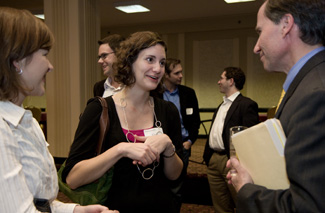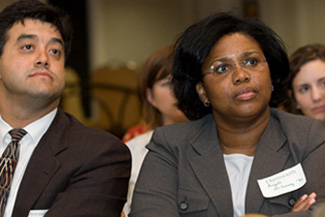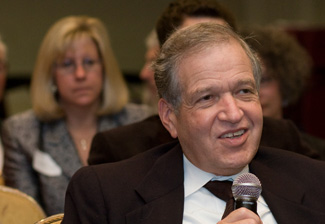The way to find the right president for a college that provides an undergraduate education like no other in the world is to conduct a search like no other. This seems to be the message of the Dartmouth College Board of Trustees, which has cast a giant net to solicit input on the search for the next Dartmouth president from all corners of the Dartmouth community and beyond.In terms of alumni input alone, they've held meetings with alumni in the Upper Valley; obtained input from the Alumni Council and alumni class volunteers; and launched a Web site where any member of the Dartmouth community can submit a recommendation. Trustee Al Mulley '70, MD, chair of the Presidential Search Committee, discussed the search process at the Alumni Council session in May, at a Reunion event in June, and at Class Officers Weekend in September. In October, a regional alumni discussion series will send Mulley, who is chief of the General Medicine Division and director of the Medical Practices Evaluation Center at Massachusetts General Hospital and associate professor of medicine and of health policy at Harvard Medical School, to San Francisco to discuss the search with alumni there. This follows similar events in September with alumni in New York; Washington, DC; and Boston.

Alumni who gathered at the Boston Park Plaza on September 25 had a wide range of questions about the search and candidate pool for the next Dartmouth president, who will be only the 17th in the College's 239-year history. But the discussion began, ended, and was threaded through with questions focused on Dartmouth's distinctive culture and how best to find the ideal leader to safeguard it and take it into the future.
Alumni representing class years from 1948 to 2008, as well as a few parents and students, attended the discussion. Thirteen of the fifteen members of the search committee were in the audience, as was John Isaacson '68, president of Isaacson, Miller, the executive search firm hired by the College as a consultant to the search process.
“We have a very good representation of the search committee here tonight,” Mulley noted in introducing the committee members, “and we're here primarily to listen.”
After recapping the progress of the search since February, when President James Wright announced his intention to step down in June 2009, Mulley estimated a timeline for the remainder of the process. The committee is currently engaged in “building a strong pool of prospects through its networking process,” he said, and will likely begin conducting interviews after January. Committee members expect to make candidate recommendations to the board of trustees in middle to late spring.
In addition to giving the alumni a preview of The Opportunity for Leadership at Dartmouth, the document that outlines the qualifications the committee seeks in candidates and the challenges faced by higher education, Mulley identified three commitments the board made at the outset and the search committee has adopted: The search is being conducted “with as much transparency as possible and as much confidentiality as necessary”; the committee is using “a very aggressive search strategy,” not only "seeking nominations from the Dartmouth community, but actively eliciting nominations from far and wide,” both within and outside academia (more than 100 recommendations have come in through the Presidential Search Committee Web site, and Mulley said he welcomed more); and the committee is taking "full advantage of the opportunity that institutional leadership transition gives us for institutional learning."
“We see this as an important time to listen to one another," Mulley said, "to learn what Dartmouth's distinctive character is and what that means for future leadership.”

What's singular about Dartmouth, he noted, is “the way it leverages its size, its temperament, and its warmth, by its commitment to teaching, to create enduring bonds among students, and between students and faculty, by drawing students into partnerships in learning and in discovery.”
Matt Berman Hoffman '82 asked Mulley to discuss the internal search—"candidates who are currently employed at Dartmouth, have an affiliation with Dartmouth, or are Dartmouth graduates"—and how "important it is in the overall criteria.” John Glovsky '65 voiced his concern that only an alumnus of the College could truly understand the unparalleled undergraduate experience it offers.

“Clearly, knowledge of and an affinity for Dartmouth are important,” Mulley responded. “An understanding of Dartmouth, of its history and its legacy and of what should stay the same about Dartmouth, and what should change in modern times—this is essential."
That affinity may or may not be found in an alum, Mulley said. "We don't want to be making dichotomous choices. We're doing our best to synthesize what we've been hearing from the entire Dartmouth community. And we're using that synthesis to understand the distinctiveness of Dartmouth, how it positions Dartmouth to lead in higher education, and what leadership qualities will most allow an individual to leverage Dartmouth's position.”
Bob Thurer '67 wondered how the committee balances the need to define the current challenges and find candidates who “fulfill a wish list” with the possibility of finding candidates whose set of priorities may be slightly different but might in fact expand the vision of the search.
The committee "isn't writing a job description," Mulley said, noting that this is "not the way to attract a leader."
"The way we're trying to attract a rich leadership pool is to say, ‘Here are challenges that are being faced across higher education, and here's what's special and distinctive about Dartmouth. Here's how we think Dartmouth matches up against some of those challenges.'" As an example, he cited the possible threats and opportunities arising for institutions out of the merging of the information revolution and internationalism.
A young alum told Mulley he hoped that "somewhere in your list of leadership qualities is a commitment to and passion for bringing the best professors and students to the school." He pointed out that "Dartmouth isn't just a place. It's the people who were there. And the hope is that the people coming after us are even better."
In response, Mulley highlighted one of the challenges listed in the Leadership document: “Attracting the strongest students to the Dartmouth vision."
This is not the same as attracting the strongest students to Dartmouth, he emphasized. "We want to articulate clearly to prospective students this distinctiveness of Dartmouth, that you can go to Williams or Amherst, but you're not going to have the opportunity to regularly work with faculty who are defining their fields. You can do that at Dartmouth in a small community that thrives by creating enduring bonds.”
Addressing some of the many other questions the attendees posed, Mulley said that diversity is “a very important part of the committee's commitment to a very active search.” In seeking the strongest possible leader for Dartmouth, the committee “is actively pursuing people who represent the diversity we all recognize as important in higher education.” He noted the committee is guided by the College's mission statement, which “pursues not just diversity by numbers, but in really learning from one another.”
Mulley described the amount of input President Wright is having on the search as “very little." He called the president "the consummate CEO, repeatedly saying, ‘I'm willing to be helpful any way I can, but I know this is not my job.'”
The search committee has no plans to share a short list of candidates with the public, Mulley said in response to a question from Nicole Sass '05.
He cited concurrent searches at Johns Hopkins, Northwestern, Swarthmore, and other schools and said, "The people we want to recruit into our candidate pool have a lot of leadership capital to use in their institution or to transfer to another," and although some public universities are required to identify candidates, "it's the consensus among academics who study this kind of search process that this significantly weakens the pool of candidates they have to choose from."
Marie Der, mother of Merlica Coriolan '10, said before the meeting that she was there "as an emissary" for her daughter. "She feels it's her duty to understand the process, and she loves President Wright, but she's busy with classes. She emailed me, ‘you have to go to this.'
"When I call her tonight," said Der, "she'll want to know who spoke and what questions were asked. “
After the meeting, Isaacson noted the singularity of the Dartmouth presidential search process.
“All higher education institution searches consult with students, faculty, and alumni," he said. "Dartmouth's search is different in degree: more meetings, over a wider geography, and a much longer period of time. The Dartmouth search has reached out to every constituency—faculty, students, and alumni—more consistently and over a much longer period of time than any other search I've been involved with.”
